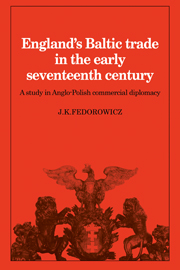 England's Baltic Trade in the Early Seventeenth Century
England's Baltic Trade in the Early Seventeenth Century Published online by Cambridge University Press: 05 November 2011
Poland has traditionally been too distant from England to be familiar, yet too close to be exotic. This probably accounts for a general lack of interest in Poland or its history on the part of most English historians until recent times. Among the few who did concern themselves with the subject are some who made statements which can charitably be described as astonishing. In the light of Poland's dismemberment and political disappearance throughout the nineteenth century this may seem natural enough, but it is unjustified for earlier centuries. Poland played an important role in the general European economy as a major supplier of basic raw materials for the embryonic industries of western Europe. Indeed, the Baltic trade, which was fuelled largely by Poland until the middle of the seventeenth century, was one of the axes around which European commerce revolved. A trade which was so obviously significant in the case of the Hanseatic League and the Dutch was only slightly less so in the case of the English. England not only had a substantial and strategically vital direct trade into the Danish Sound, but it also enjoyed extensive exchanges with North German and Dutch merchants involving products imported by the latter from the Baltic. In an age when economic history has amplified more traditional ways of regarding the past, this fact of active commercial ties between England and Poland has stimulated some interest among historians, giving relevance to a study of Anglo-Polish relations which had hitherto seemed too excessively episodic and esoteric for serious historical consideration.
To save this book to your Kindle, first ensure [email protected] is added to your Approved Personal Document E-mail List under your Personal Document Settings on the Manage Your Content and Devices page of your Amazon account. Then enter the ‘name’ part of your Kindle email address below. Find out more about saving to your Kindle.
Note you can select to save to either the @free.kindle.com or @kindle.com variations. ‘@free.kindle.com’ emails are free but can only be saved to your device when it is connected to wi-fi. ‘@kindle.com’ emails can be delivered even when you are not connected to wi-fi, but note that service fees apply.
Find out more about the Kindle Personal Document Service.
To save content items to your account, please confirm that you agree to abide by our usage policies. If this is the first time you use this feature, you will be asked to authorise Cambridge Core to connect with your account. Find out more about saving content to Dropbox.
To save content items to your account, please confirm that you agree to abide by our usage policies. If this is the first time you use this feature, you will be asked to authorise Cambridge Core to connect with your account. Find out more about saving content to Google Drive.